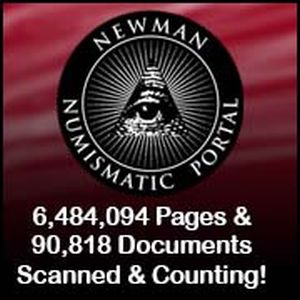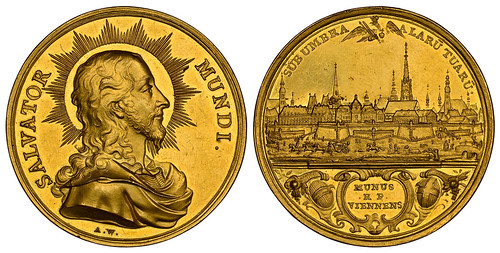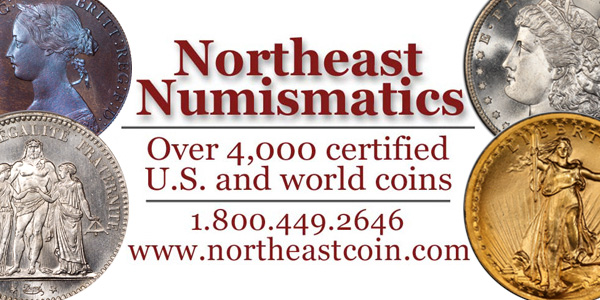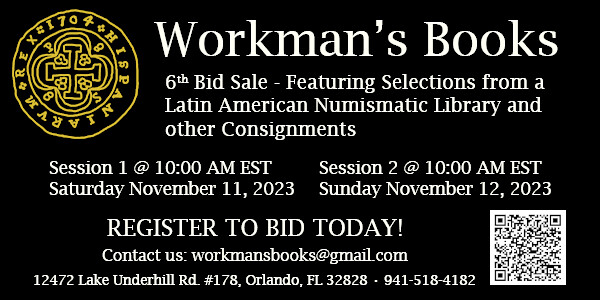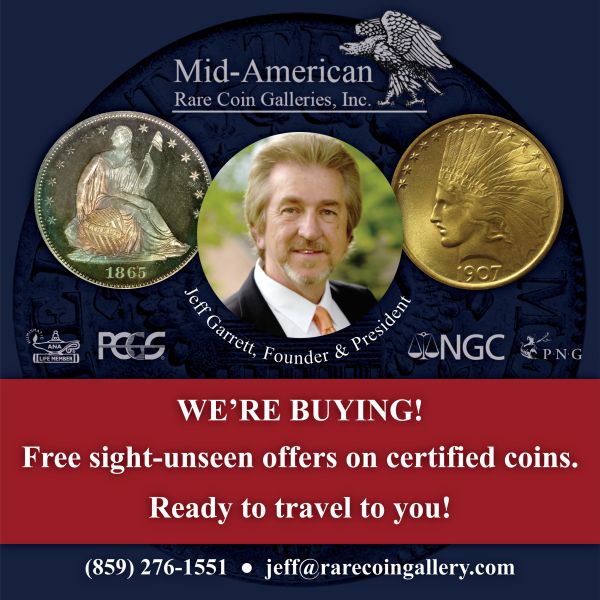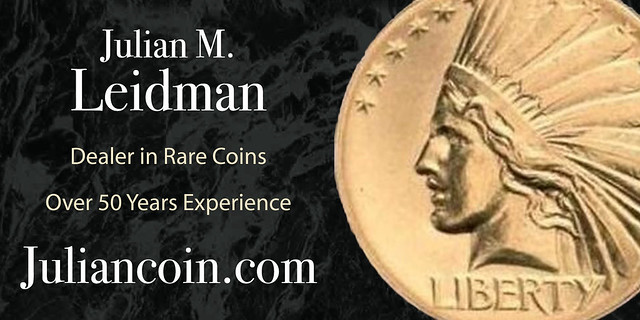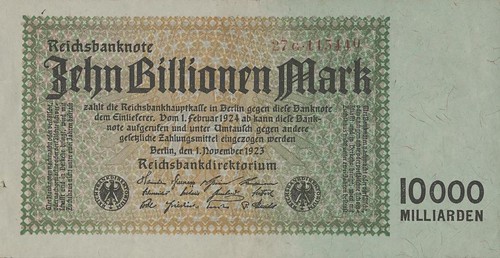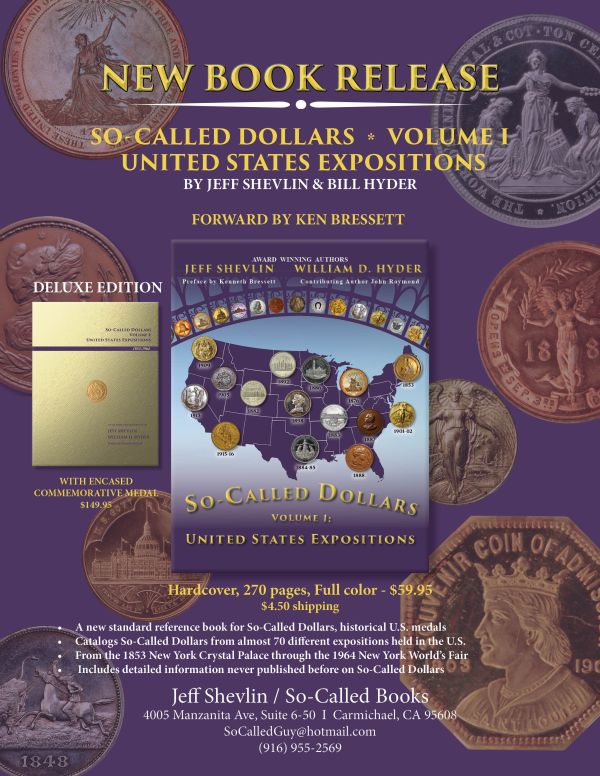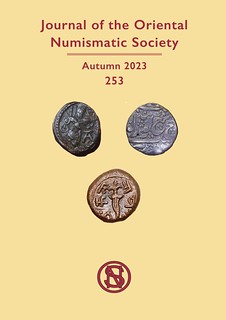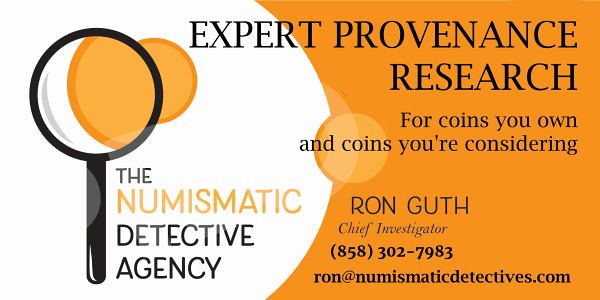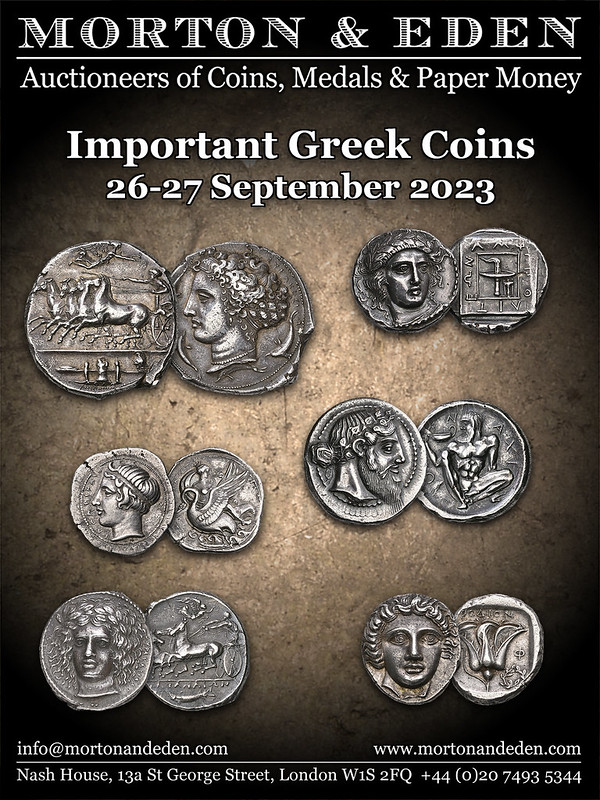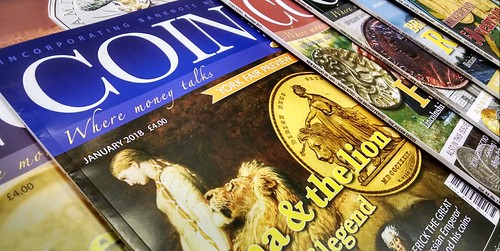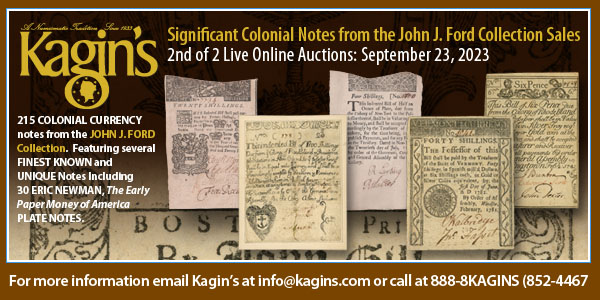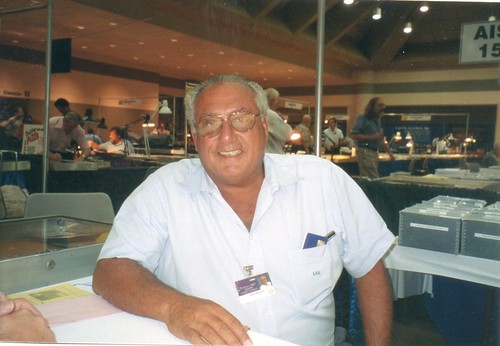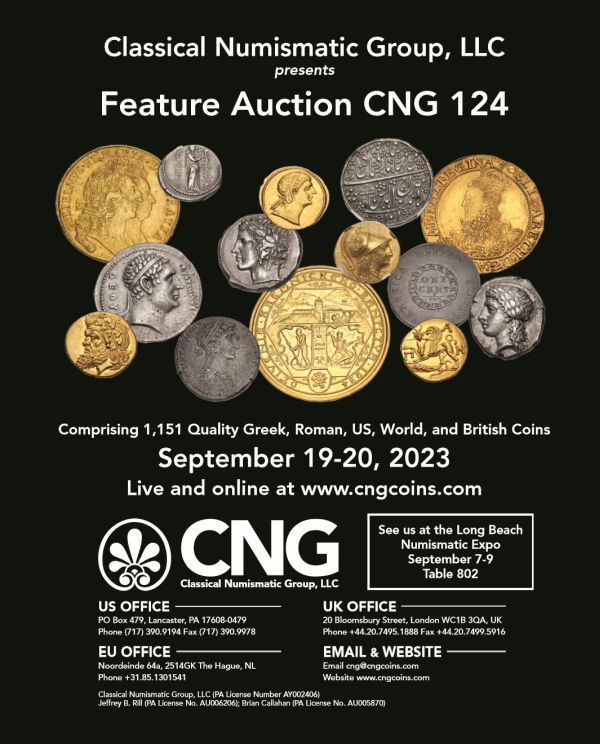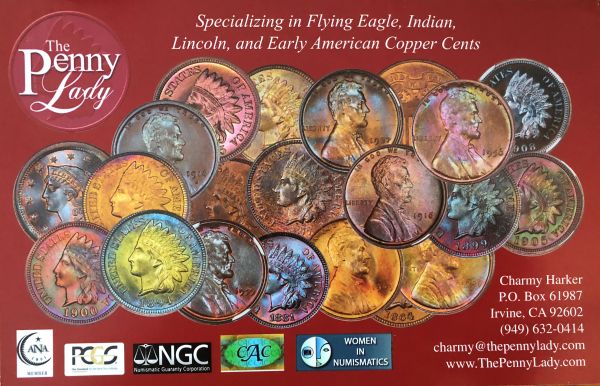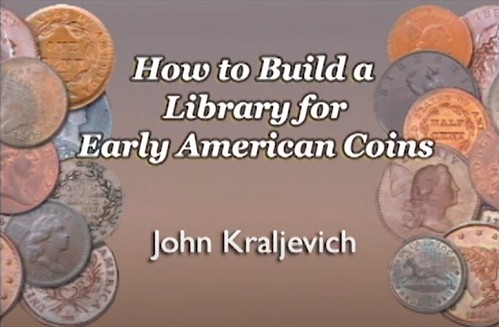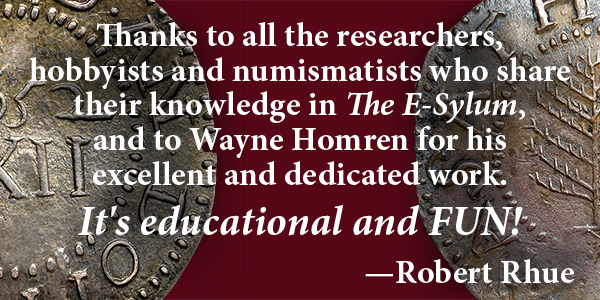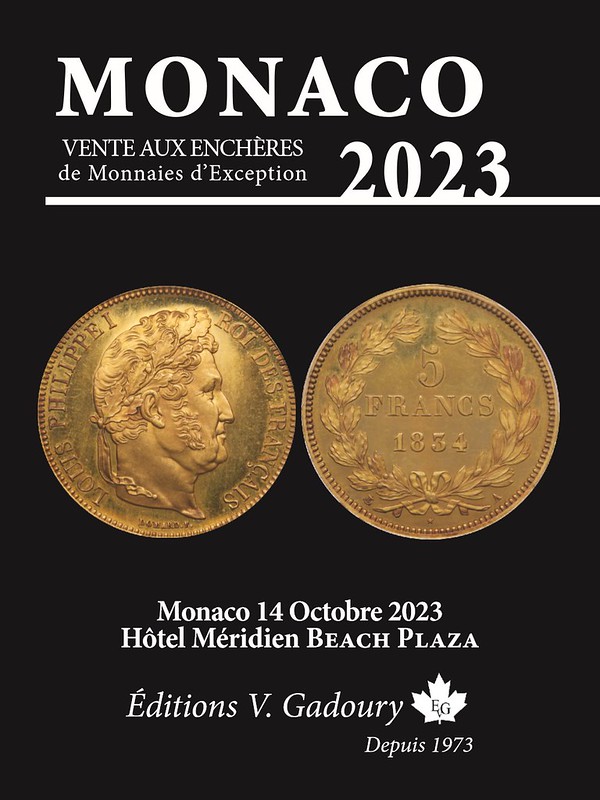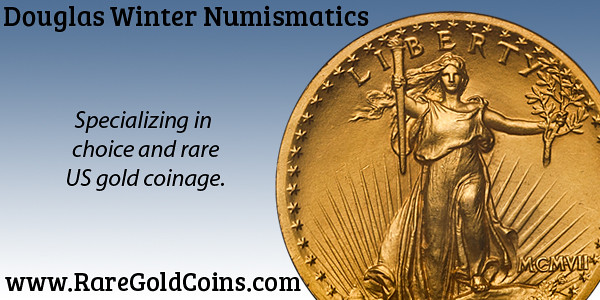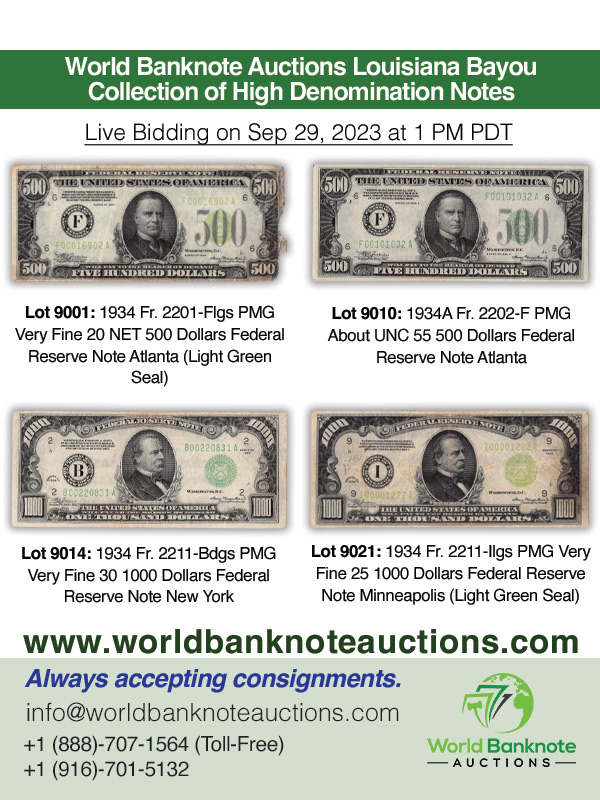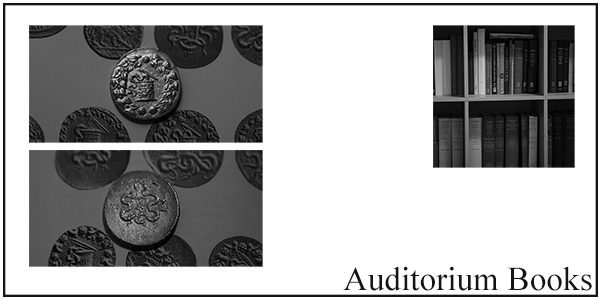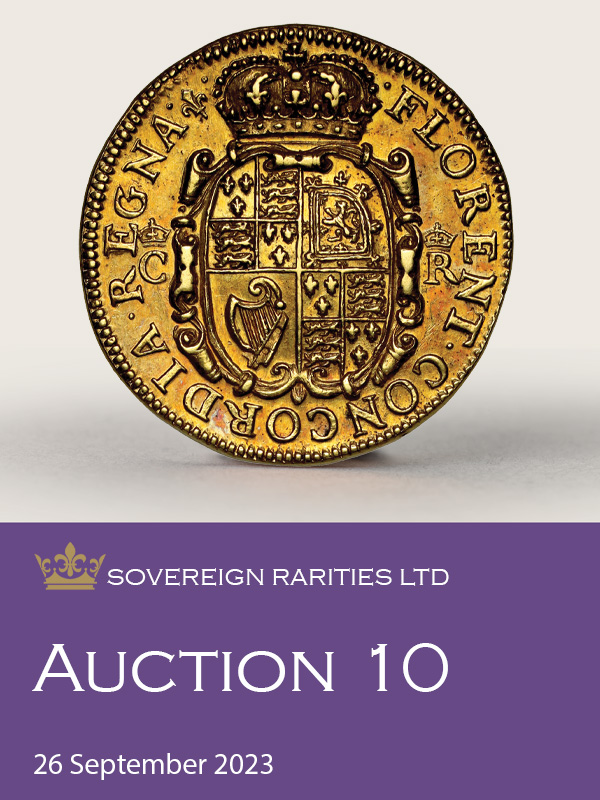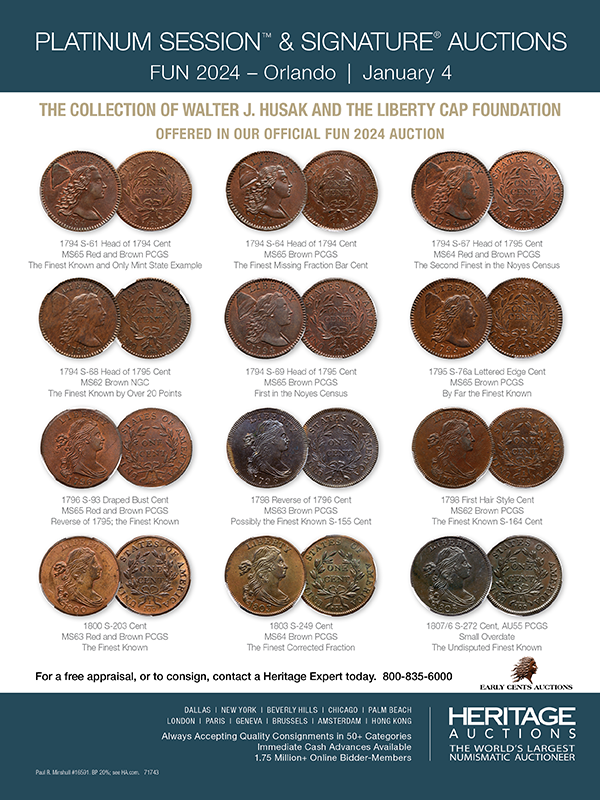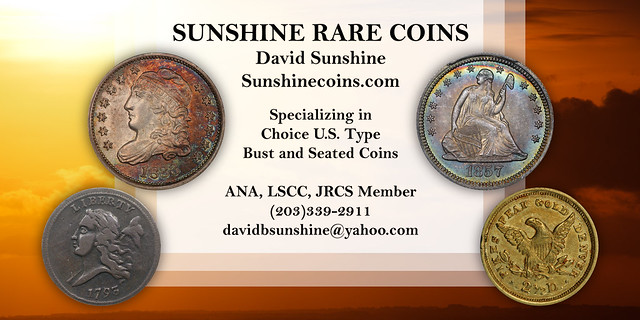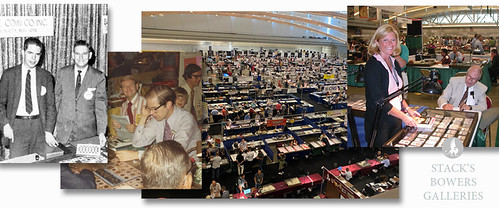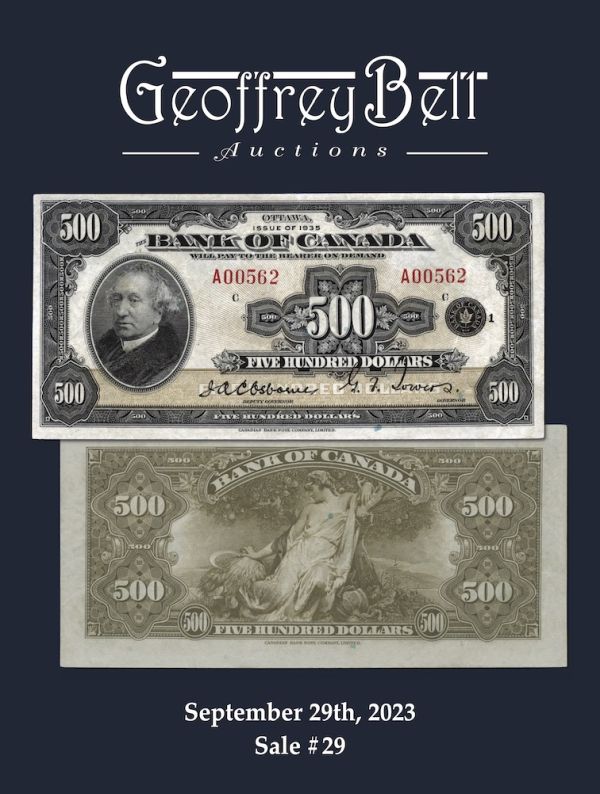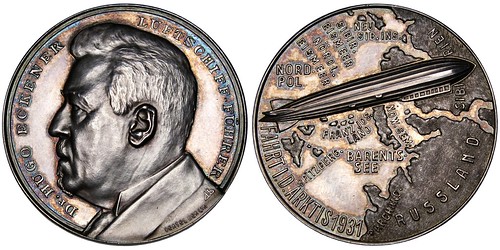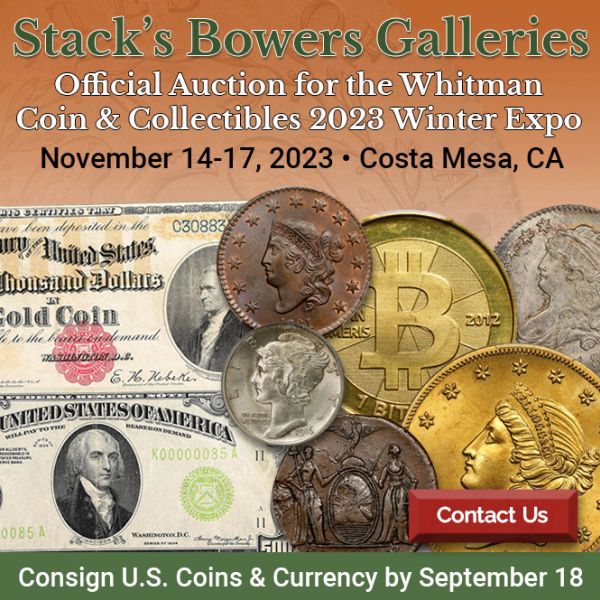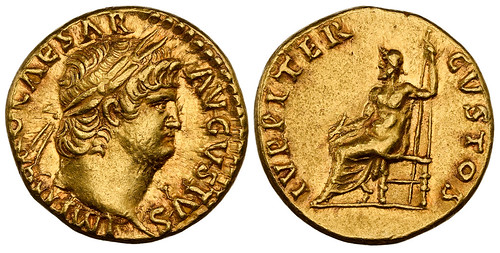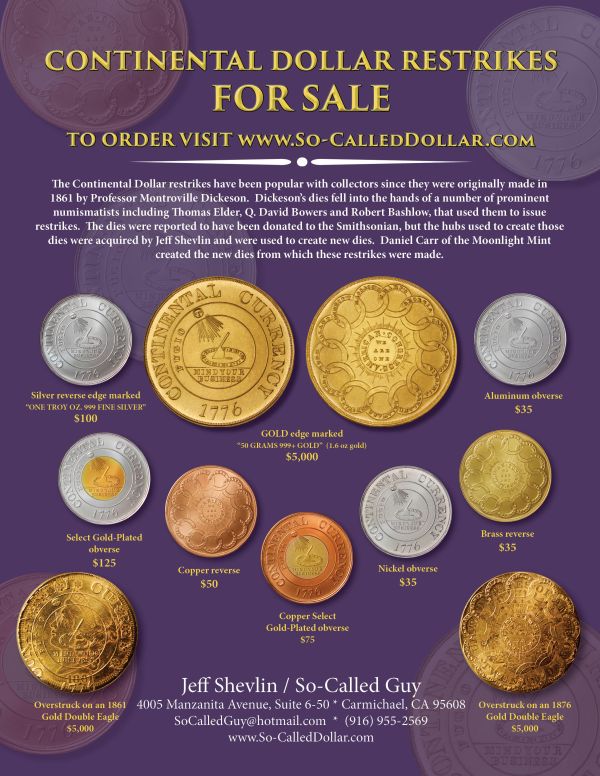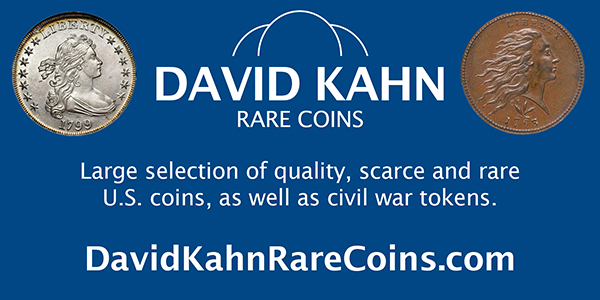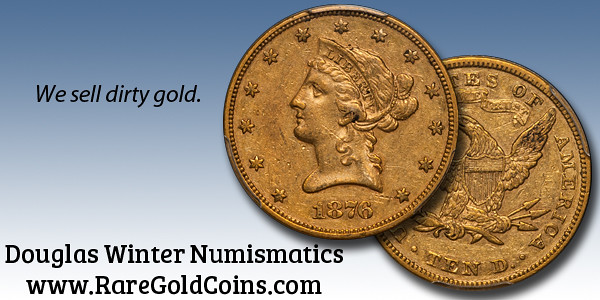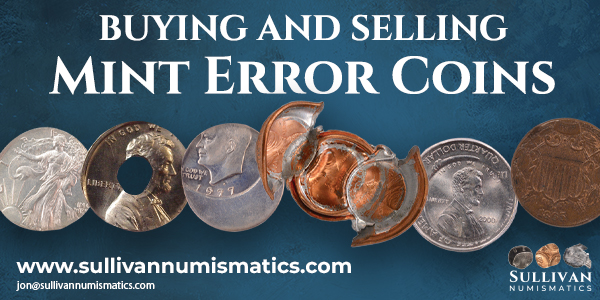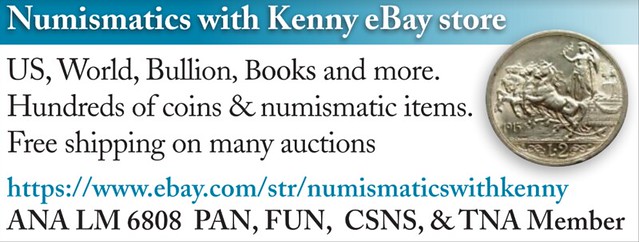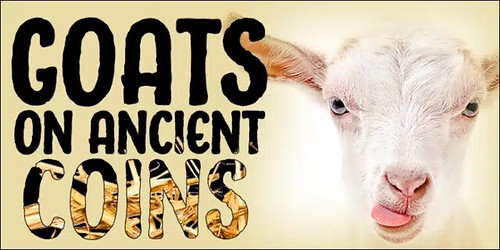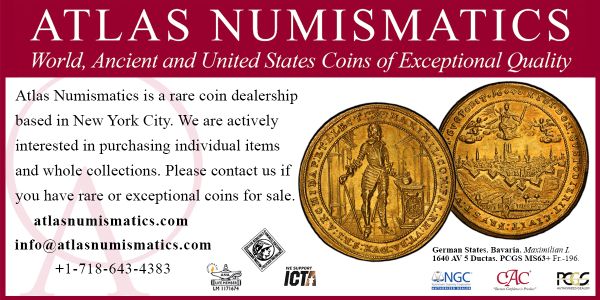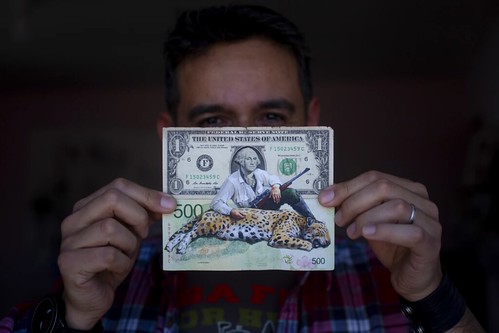
Visit our NBS Sponsors




About UsThe Numismatic Bibliomania Society is a non-profit association devoted to the study and enjoyment of numismatic literature. For more information please see our web site at coinbooks.org SubscriptionsThose wishing to become new E-Sylum subscribers (or wishing to Unsubscribe) can go to the following web page link MembershipThere is a membership application available on the web site Membership Application To join, print the application and return it with your check to the address printed on the application. Print/Digital membership is $40 to addresses in the U.S., and $60 elsewhere. A digital-only membership is available for $25. For those without web access, write to: Charles Heck, Treasurer AsylumFor Asylum mailing address changes and other membership questions, contact Chuck at this email address: treasurer@coinbooks.org SubmissionsTo submit items for publication in The E-Sylum, write to the Editor at this address: whomren@gmail.com BUY THE BOOK BEFORE THE COIN |
- WAYNE'S WORDS: THE E-SYLUM SEPTEMBER 17, 2023
- KOLBE & FANNING SEPTEMBER 2023 SALE HIGHLIGHTS
- NEW BOOK: FRANKLIN AND KENNEDY HALF DOLLARS, 4TH ED.
- NEW BOOK: 2023 RENNIKS AUSTRALIAN VALUES
- NEW BOOK: THE CONTINENTAL DOLLAR
- NEW BOOK: INFLATION 1923
- ORIENTAL NUMISMATIC SOCIETY AUTUMN 2023
- BOOK REVIEW: DICTIONARY OF NUMISMATIC NAMES
- DALE SEPPA (1940–2023)
- JOHN MUSSELL (1942-2023)
- ARTHUR H. MOROWITZ (1943-2023)
- U.S. PATTERN PHOTO SETS ON NEWMAN PORTAL
- VIDEO: HOW TO BUILD A LIBRARY
- NOTES FROM E-SYLUM READERS: SEPTEMBER 17, 2023
- KARL GOETZ MEDALS FOR A NEW GENERATION
- VOCABULARY TERM: OBVERSE
- ORIGINALS, COPIES, AND TYPEWRITTEN LETTERS
- BILL GROOM INTERVIEW, PART THREE
- THE AMERICAN JOURNAL OF NUMISMATICS HOARD
- KEN LOWE'S ACCOUNT OF THE HOMREN AJN HOARD
- COUNTERFEIT DETECTORS AND EPHEMERA
- MORE KOLBE & FANNING SALE HOMREN FAVORITES
- HISTORY OF THE ANA BOURSE
- NUMISMAGRAM MEDAL SELECTIONS: SEPTEMBER 17, 2023
- ATLAS NUMISMATICS SELECTIONS: SEPTEMBER 17, 2023
- HERITAGE OFFERS JOHN JAY KNOX COLLECTION
- SOVEREIGN RARITIES AUCTION 10 SELECTIONS
- GEOFFREY BELL AUCTION FALL 2023 SALE
- MDC OCTOBER 2023 FRENCH COLLECTION 1791-1795
- GOATS ON ANCIENT COINS
- MORE ON ARGENTINE ARTIST PAINTING ON BANK NOTES
Content presented in The E-Sylum is not necessarily researched or independently fact-checked, and views expressed do not necessarily represent those of the Numismatic Bibliomania Society.
WAYNE'S WORDS: THE E-SYLUM SEPTEMBER 17, 2023
 New subscribers this week include:
Tom Hockenhull and
Mike Walsh.
Welcome aboard! We now have 7,616 subscribers.
New subscribers this week include:
Tom Hockenhull and
Mike Walsh.
Welcome aboard! We now have 7,616 subscribers.
Thank you for reading The E-Sylum. If you enjoy it, please send me the email addresses of friends you think may enjoy it as well and I'll send them a subscription. Contact me at whomren@gmail.com anytime regarding your subscription, or questions, comments or suggestions about our content.
This week we open with final highlights of next week's Kolbe & Fanning numismatic literature sale, four new books, a review, three obituaries, updates from the Newman Numismatic Portal, and more.
Other topics this week include the Continental Dollar, inflation money, U.S. coin patterns, Goetz medals, the American Journal of Numismatics, counterfeit detectors, fixed price and auction highlights, goats on ancient coins and paintings on banknotes.
To learn more about Canadian tokens, Australian coins and paper money, the Oriental Numismatic Society, John Jay Knox, Albert Frey, Ralph Dickieson, Dale Seppa, John Mussell, Art Morowitz, frozen dates, the first printing of the ANS constitution, the Small Note Law Conspiracy, the Battle of Fair Oaks medal, and finding an original mint roll of bust half dollars, read on. Have a great week, everyone!
Wayne Homren
Editor, The E-Sylum
KOLBE & FANNING SEPTEMBER 2023 SALE HIGHLIGHTS
The Kolbe & Fanning September 2023 numismatic literature sale (#168) is coming up next Saturday. Here's another group of highlights, including some of my own consignments. Good luck in the sale! -Editor
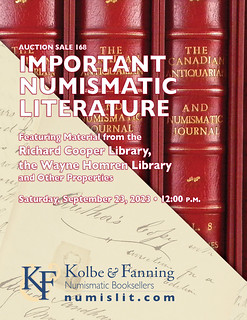 Kolbe & Fanning Numismatic Booksellers wish to remind everyone that our Sale 168 will be held on Saturday, September 23, 2023. Featuring highlights from the Richard Cooper and Wayne Homren Libraries, plus additional rare and out-of-print works on ancient, world and U.S. numismatics, the sale has much to offer. The Wayne Homren Library focuses on U.S. numismatics, and includes his extensive collection of numismatic ephemera. The Richard Cooper Library is among the finest ever formed on Canadian coins, medals and tokens, and includes important manuscripts and correspondence from Robert W. McLachlan.
Kolbe & Fanning Numismatic Booksellers wish to remind everyone that our Sale 168 will be held on Saturday, September 23, 2023. Featuring highlights from the Richard Cooper and Wayne Homren Libraries, plus additional rare and out-of-print works on ancient, world and U.S. numismatics, the sale has much to offer. The Wayne Homren Library focuses on U.S. numismatics, and includes his extensive collection of numismatic ephemera. The Richard Cooper Library is among the finest ever formed on Canadian coins, medals and tokens, and includes important manuscripts and correspondence from Robert W. McLachlan.
Some highlights of the sale include:
NEW BOOK: FRANKLIN AND KENNEDY HALF DOLLARS, 4TH ED.
Here's the press release for Whitman's new and expanded fourth edition of A Guide Book of Franklin and Kennedy Half Dollars. -Editor
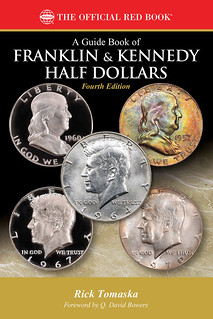 To celebrate the seventy-fifth anniversary of the first minting of the Franklin half dollar, Whitman Publishing announces an updated new edition of A Guide Book of Franklin and Kennedy Half Dollars. The 248-page fourth edition, by professional numismatist Rick Tomaska, is available online (including at www.Whitman.com) and from booksellers and hobby shops nationwide.
To celebrate the seventy-fifth anniversary of the first minting of the Franklin half dollar, Whitman Publishing announces an updated new edition of A Guide Book of Franklin and Kennedy Half Dollars. The 248-page fourth edition, by professional numismatist Rick Tomaska, is available online (including at www.Whitman.com) and from booksellers and hobby shops nationwide.
Franklin (1948–1963) and Kennedy (1964 to date) half dollars are two of the most popular series in modern U.S. coinage. Whether you're a collector spending $50 a month or an investor with a budget of $50,000, there are challenges and rewards to enjoy with these historic coins,
says author Rick Tomaska.
In addition to sharing behind-the-scenes knowledge of the retail and auction markets, Tomaska gives the history of the coins' designs, production, and other technical and cultural aspects. He explores transitions in Mint craftsmanship and reveals why Franklin and Kennedy half dollars represent the end of an era. He studies the coins date by date with commentary on exceptional and highly toned specimens, describes how Proof coins are made and graded, and teaches about Cameo and Deep Cameo contrast, Full Bell Lines, certified coin populations, and other factors important to value and rarity. Collectible die varieties, tips for smart buying, and hundreds of full-color photographs round out the contents.
NEW BOOK: 2023 RENNIKS AUSTRALIAN VALUES
The new 2023 edition of Renniks Australian Coin & Banknote guide is available for preorder. Here's information from the publisher's site. It's available in both soft and hardcover. -Editor
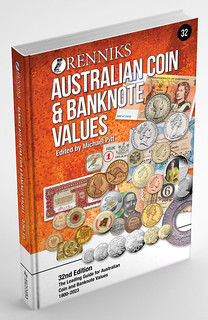 Renniks Australian Coin & Banknote Values 32nd Edition
Renniks Australian Coin & Banknote Values 32nd Edition
Australia's leading numismatic guide.
This comprehensive guide to Australian Coin & Banknote Values contains over 4,500 unique images and countless thousands of valuations. This book is a must for all collectors, whether you are just a beginning or an advanced collector. The latest information is compiled using weighted averages to assist pricing accuracy. Quality reproduction of photos makes it easy to identify items. Covered are copper, silver, gold, nickel, and all coins and notes used in Australia from 1800 to the present. Subjects include Pre-Decimal and Decimal currency and privately issued banknotes, war issues, and privately issued tokens. Also included are the latest Royal Australian Mint, Perth Mint & Australia Post Numismatic Covers.
NEW BOOK: THE CONTINENTAL DOLLAR
OK, numismatists, this is NOT a book that resolves the mystery of "Continental dollar" coins/medals. Rather, it is an exploration of the monetary history of the American Revolution, but likely well worth reading as "an essential origin story of the early American monetary system." Perhaps pulling threads on the eighteenth-century records referenced will lead to additional clues on the "Continentals" stamped in hard metals. Or not. -Editor
The Continental Dollar
How the American Revolution Was Financed with Paper Money
Farley Grubb
An illuminating history of America's original credit market.
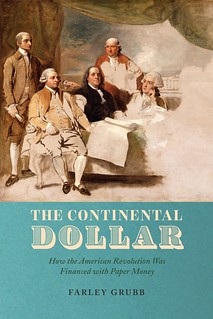 The Continental Dollar is a revelatory history of how the fledgling United States paid for its first war. Farley Grubb upends the common telling of this story, in which the United States printed cross-colony money, called Continentals, to serve as an early fiat currency—a currency that is not tied to a commodity like gold, but rather to a legal authority. As Grubb details, the Continental was not a fiat currency, but a
The Continental Dollar is a revelatory history of how the fledgling United States paid for its first war. Farley Grubb upends the common telling of this story, in which the United States printed cross-colony money, called Continentals, to serve as an early fiat currency—a currency that is not tied to a commodity like gold, but rather to a legal authority. As Grubb details, the Continental was not a fiat currency, but a zero-coupon bond
—a wholly different species of money. As bond payoffs were pushed into the future, the money's value declined, killing the Continentals' viability years before the Revolutionary War would officially end.
THE BOOK BAZARRE
NEW BOOK: INFLATION 1923
Another book on money in wartime is the catalog of a recently closed exhibit at the Historisches Museum Frankfurt on Germany's post-WWI hyperinflation. Here's a Google-translated description. -Editor
Inflation 1923. War, money, trauma
The mark keeps falling. It's scary. Today the dollar is over 1000 marks! The Swiss franc at 200! You feel sorry for the people in your soul. You can literally see the misery spreading […],
wrote the Swiss student Lilly Staudenmann-Stettler, who lived in Frankfurt, in August 1922. Little did she know that at the end of 1923 one dollar would cost 4.2 trillion marks. The crisis year of hyperinflation is now being looked at 100 years later by the Frankfurt Historical Museum with a special exhibition.
ORIENTAL NUMISMATIC SOCIETY AUTUMN 2023
The latest issue of the Journal of the Oriental Numismatic Society has been published. Editor Paula Turner submitted the issue contents. Thank you. -Editor
An overstruck Parthian chalkous of Pacorus II
Seyed Omid Mohammadi and Seyed Mahdi Alavi
How the privy marks on Aksumite coins might be interpreted
Robert Keck and Wolfgang Hahn
An attempt to attribute coins bearing the legend rama rao
Mohit Kapoor and Purnanand Sanket
Sikh coins: enigmatic silver rupees of Amritsar mint with extra fateh
Gurprit Singh
BOOK REVIEW: DICTIONARY OF NUMISMATIC NAMES
Charles Morgan of CoinWeek published a nice article on the landmark book by Albert R. Frey - Dictionary of Numismatic Names. Here's an excerpt - see the complete article online. -Editor
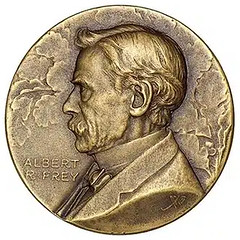 I'd like to share with you a few thoughts about a book by one of these figures of the past–early 20th-century numismatist Albert R. Frey–that I recently acquired.
I'd like to share with you a few thoughts about a book by one of these figures of the past–early 20th-century numismatist Albert R. Frey–that I recently acquired.
Frey was a major figure in the New York City numismatic scene in the early 1900s. Born in 1858, he was active around the turn of the century, publishing books on coins and encased postage stamps. Frey joined the American Numismatic Association (ANA) in December 1900 and was given member number 225. He later adopted the number 12. In 1905, Frey was elected President of the Association. As president, he sought to strengthen the ANA's bona fides, bringing it more up the level of his hometown American Numismatic Society (ANS) (which he joined in 1910). In 1911, he took over editorial duties on The Numismatist.
DALE SEPPA (1940–2023)
Alan Luedeking wrote that " one of the great stalwarts of numismatic knowledge and research and literature has left us — Dale Seppa." Alan passed along Al Buonaguro's tribute to Seppa which we're publishing here with permission. I've added an image of Dale's book on Ecuadorian coins. -Editor
For many decades the name Dale Seppa has been synonymous with Ecuadorian numismatics. He was the go-to dealer for this complex numismatic specialty. His recent passing leaves a real void. For many years I collaborated and corresponded with Dale. Let this reminiscence be a fitting tribute and final farewell.
I never met Dale Seppa. That might seem like an odd start to a tribute so let me explain. In the 1960s I was a novice collector just developing an interest in Latin American coinage. I quickly discovered Dale's extensive and informative price lists. I got on his mailing list, became a customer and bought all of the many books he co-authored. In the course of business, I would sometimes pose a question about some item and was impressed that I always got a thoughtful response. Thus began our correspondence.
JOHN MUSSELL (1942-2023)
Richard Lobel alerted me that John Mussell of Token Publishing has passed. Sorry to hear the news. The company website notes, "It is with great sadness that we have to report the passing of Group Managing Editor John Mussell on September 7, 2023." Here's some information from an article published recently in the company's COIN NEWS. -Editor
TOKEN Publishing Ltd has been around for 40 years now, and at the helm throughout those four decades has been John Mussell, Managing Editor first of COIN & MEDAL NEWS (from 1983–89) then of two separate magazines (COIN NEWS and MEDAL NEWS) from 1989 onwards. In addition to the magazines, we have also published a plethora of books over the years, from the annual YEARBOOKS to numerous one-off titles, all of which he has been keen to oversee. Whilst he has been steering the ship, as it were, there have, of course, been numerous others helping him out, not least his wife Carol who joined Token in 1990 and son Philip who joined in 1996, both now Directors of the company alongside him.
ARTHUR H. MOROWITZ (1943-2023)
Pablo Hoffman and Alan Luedeking alerted me to the passing of Art Morowitz of Champion Stamp Company of New York City. Arthur's son Jonathan provided the following photo. Thank you; very sorry for your loss. -Editor
Pablo writes:
I have no doubt that many remembrances and reminiscences will also be coming your way, of great interest to many of your readers, in the near future. Arthur was, to put it in the mildest terms, a
colorful character,
known and cherished for his uninhibited individualism, daring, and sagacity. He was a successful captain at the helm of Champion Stamp Company, still operating and the last of what were once numerous street-level numismatic/philatelic businesses in New York City. He was a towering figure in the disparate arenas he operated in, and was a mentor, role model, and supporter in many ways, not only for his three sons, but for virtually everyone with whom he interacted, including myself.
U.S. PATTERN PHOTO SETS ON NEWMAN PORTAL
The latest additions to the Newman Numismatic Portal are photos of Augustus Saint-Gaudens' personal Ultra High Relief double eagle. Project Coordinator Len Augsburger provided the following report. -Editor
U.S. Pattern Photo Sets on Newman Portal
Saul Teichman continues to build the U.S. pattern photo sets on Newman Portal and has developed extensive census data on the most important patterns in the U.S. series. The Ultra High Relief St. Gaudens twenty (Judd-1907 to Judd-1909) represents the most artistic work in the entire U.S. coin and medal series, and the Teichman file on this coin enumerates two examples of the Judd-1907 (edge lettered with stars in between letters), twelve of the Judd-1908 (plain edge), and five of the Judd-1909 (edge lettered with stars in between words). Especially noteworthy is Augustus Saint-Guadens' personal piece, currently in the Tyrant collection, with ASG
etched on the edge.
VIDEO: HOW TO BUILD A LIBRARY
The David Lisot Video Library on the Newman Numismatic Portal can be found at:
https://nnp.wustl.edu/library/multimediadetail/522852
We highlight one of his videos each week in The E-Sylum. Here's one from the 2007 Early American Coppers convention with John Kraljevich speaking on "How to Build a Library for Early American Coins". -Editor
NOTES FROM E-SYLUM READERS: SEPTEMBER 17, 2023
Bargello Museum Medal Catalog Sought
Leon Saryan writes:
"I am trying to track down two Renaissance era medals reported several decades ago to be in the collection of the Bargello National Museum of Florence, Italy. I am wondering if their extensive medal collection has ever been published.
If so, it would help to have the title and if possible where a copy might be located (such as the ANS or ANA libraries). Thanks in advance for any suggestions readers might be able to offer."
Can anyone help? -Editor
Other topics this week include Frozen Dates, Catalog Numbering Systems, and calotype images in numismatics. -Editor
KARL GOETZ MEDALS FOR A NEW GENERATION
Dale Krueger passed along two videos as a followup to his note last week about his upcoming appearance on the the Boom America show. In the first one, Dale provides a nice overview of Karl Goetz medals and his journey collecting them. -Editor
VOCABULARY TERM: OBVERSE
Here's a cornerstone entry from Dick Johnson's Encyclopedia of Coin and Medal Terminology - the definition of "Obverse". -Editor
Obverse. The side of a numismatic item bearing the principal design or device; the side opposite the reverse. A number of design and technical factors determine which side of a two- sided numismatic or medallic item is the obverse, these are listed below.
Design Factors Determining Obverse (1) Most often the obverse is the side bearing a portrait; in countries with a monarch, the featured ruler's head or bust appears on the obverse.
ORIGINALS, COPIES, AND TYPEWRITTEN LETTERS
E-Sylum Feature Writer and American Numismatic Biographies author Pete Smith submitted this interesting discussion on the value of a typewritten letter. Thanks! -Editor
Last week Wayne mentioned lot 526 in the upcoming auction of selections from his library.
Within that lot is 41) typewritten letter from Wayne Homren to Pete Smith dated March 2,
1993.
My immediate reaction is that it was not a typewritten letter. By 1993, both of us were
using computers with word processing software. Does that make a difference to anyone?
I have seen a lot of changes in typesetting and printing in the past sixty years. I got through college with a portable Smith Corona manual typewriter. Out in the real world, the industry standard was the IBM Selectric Typewriter with the bouncing ball. It has been fifty years since I saw my first word-processing machine.
BILL GROOM INTERVIEW, PART THREE
Greg Bennick's latest interview for the Newman Numismatic Portal is with counterstamp researcher Bill Groom. Here's the third of four parts, where Bill discusses his collection and working with other researchers and catalogers. -Editor
Greg Bennick How large is your counterstamp collection and how did you acquire so many of them - you had mentioned before 2700 pieces, I think you said.
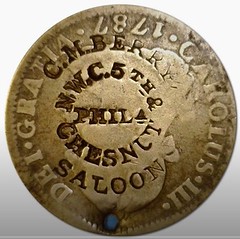 Bill Groom
That's right. Most of them I got at shows, auctions - dealers would set them aside for me,
that I made purchases from. One of the things I would do if a dealer showed me a piece on
let's say I had a dealer friend sold me a piece for $15. It was a counter stamped large cent.
He only wanted $15. So I handed him $75 and said,
Bill Groom
That's right. Most of them I got at shows, auctions - dealers would set them aside for me,
that I made purchases from. One of the things I would do if a dealer showed me a piece on
let's say I had a dealer friend sold me a piece for $15. It was a counter stamped large cent.
He only wanted $15. So I handed him $75 and said, This coin to me is worth $125 to
$150 I'll split the difference with you.
Greg Bennick Amazing.
Bill Groom And then he would come back and sell me more. So I you know, by getting dealers interested in finding them for me, that was a way to get that they would keep coming my way. And some people have seen my articles and contacted me, so. But I would say most of the pieces I got came from shows. I used to be able to come home from shows in the eighties with a dozen, 15, 20, 30 at a time. Like I say, that one bag from Richard Rossa was, I think around 30 or 40 pieces in that bag. But nowadays I go to a big show and if I come home with one or two in my pocket, I'm lucky.
THE BOOK BAZARRE
THE AMERICAN JOURNAL OF NUMISMATICS HOARD
One of the lots Kolbe & Fanning highlighted in their current sale is my group of AJN issues selected from the back issue hoard I was fortunate to acquire over twenty-five years ago. Here's the catalog description. -Editor
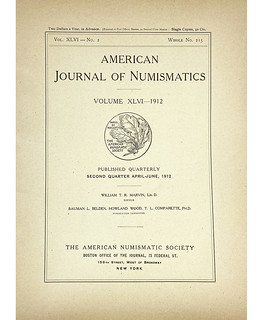 [American Numismatic Society] American Numismatic & Archæological Society; Boston Numismatic Society; American Numismatic Society. AMERICAN JOURNAL OF NUMISMATICS. Twenty-four complete volumes, being Volumes 1, 3, 4, 11, 12, 13, 14, 15, 16, 19, 20, 21, 22, 26, 29, 30, 32, 40, 42, 43, 44, 47, 49 and 52 (New York and Boston, 1866–1918). Additional issues from twelve incomplete volumes also present: Volume 2, Nos. 3–12; Volume 5, Nos. 1 and 3; Volume 7, Nos. 2–4; Volume 10, Nos. 3–4; Volume 33, Nos. 1–2 and 4; Volume 34, Nos. 2–3; Volume 35, Nos. 1 and 4; Volume 38, No. 4; Volume 41, Nos. 1, 3 and 4; Volume 45, Nos. 2–4; Volume 46, Nos. 2–4; and Volume 53, Parts II and III. Varying 4to sizes, all in the original printed paper covers. A few copies with worn or stained covers, but generally fine and often pristine copies.
[American Numismatic Society] American Numismatic & Archæological Society; Boston Numismatic Society; American Numismatic Society. AMERICAN JOURNAL OF NUMISMATICS. Twenty-four complete volumes, being Volumes 1, 3, 4, 11, 12, 13, 14, 15, 16, 19, 20, 21, 22, 26, 29, 30, 32, 40, 42, 43, 44, 47, 49 and 52 (New York and Boston, 1866–1918). Additional issues from twelve incomplete volumes also present: Volume 2, Nos. 3–12; Volume 5, Nos. 1 and 3; Volume 7, Nos. 2–4; Volume 10, Nos. 3–4; Volume 33, Nos. 1–2 and 4; Volume 34, Nos. 2–3; Volume 35, Nos. 1 and 4; Volume 38, No. 4; Volume 41, Nos. 1, 3 and 4; Volume 45, Nos. 2–4; Volume 46, Nos. 2–4; and Volume 53, Parts II and III. Varying 4to sizes, all in the original printed paper covers. A few copies with worn or stained covers, but generally fine and often pristine copies.
A remarkable offering of original issues of the American Journal of Numismatics, nearly all of them unusually well-preserved and in original state. These are Wayne Homren's personal copies selected from the hoard of back issues discovered by him in late 1997. The hoard was the remnants of those issues obtained from the American Numismatic Society by the Johnson Reprint Company when they produced their reproduction of the AJN. Homren retained one copy of each issue present in the hoard, selling the rest of them through the Money Tree (the firm's principals, Myron Xenos and Ken Lowe, tell the story in Out on a Limb No. 21 (January 1998).
KEN LOWE'S ACCOUNT OF THE HOMREN AJN HOARD
Here's the Money Tree Out on a Limb account of my discovery, and their later sale, of the publisher's backstock hoard of the American Journal of Numismatics, courtesy of the Newman Numismatic Portal. I've left in the asides and digressions to capture the full flavor of cataloguer Ken Lowe's personality and writing style. I corrected some typos and several OCR errors. -Editor
The highlight of this issue is the offering of the "HOMREN HOARD" of issues of the AMERICAN JOURNAL OF NUMISMATICS, a hoard that had been ignored, overlooked, and/or forgotten for half a century. We are thrilled to tell you the tale. We are also honored to be the exclusive distributors of these issues. [See page 22]
AMERICAN JOURNAL OF NUMISMATICS BACK-ISSUE HOARD DISCOVERED
[NOTE: On Monday December 8, 1997, this news release was sent to the numismatic media and also was sent out over the INTERNET]
COUNTERFEIT DETECTORS AND EPHEMERA
Another favorite item from my library is a collection of periodically published counterfeit detectors and other ephemera relating to counterfeiting in America. Here's the catalog description enumerating the group. I've added photos taken when I displayed the binders at one of my Nummis Nova dinner meetings. -Editor
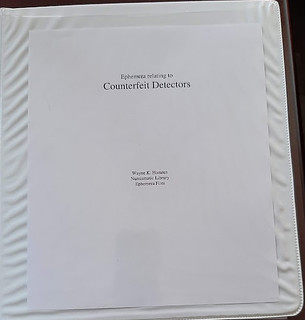 Homren, Wayne [compiler]. BINDERS 26–26B: COUNTERFEITING. Two binders, including the following:
Homren, Wayne [compiler]. BINDERS 26–26B: COUNTERFEITING. Two binders, including the following:
1) Bank Note Reporters and Counterfeit Detectors 1826–1866: A Biography compiled by William H. Dillistin (1943);
2) three issues of Sibbet's Western Review and Counterfeit Detector (November 1840, December 1840, and September 1841) with subscription form;
3) an incomplete copy of the rare Kennedy Bank Note Detector, Pittsburgh c. 1856;
4) Bicknell's Counterfeit Detector and Bank Note List by Matthew T. Miller (October 1, 1839);
5) Eastman's Treatise on Counterfeit, Altered and Spurious Bank Notes, with Unerring Rules for the Detection of Frauds in the Same together with a History of Ancient Money, Continental Currency, Banks, Banking, Bank of England, and Other Valuable Information as to Money, with Hints to Business Success by H.G. Eastman (3rd edition, 1859);
MORE KOLBE & FANNING SALE HOMREN FAVORITES
OK, one last article about my consignment and I'll shut up already. Here are some additional lots I think are special in one way or another. -Editor
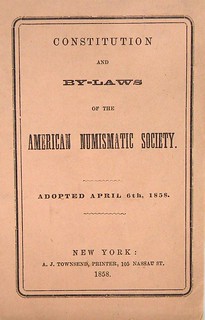 1858 ANS Constitution and By-Laws
1858 ANS Constitution and By-Laws
Lot 271: American Numismatic Society. CONSTITUTION AND BY-LAWS OF THE AMERICAN NUMISMATIC SOCIETY. ADOPTED APRIL 6TH, 1858. New York: A.J. Townsend, Printer, 1858. 24mo [12.5 by 8 cm], original printed salmon paper covers. 8 pages. Fine. The extremely rare first printing of the ANS constitution, the earliest publication issued by the Society. According to Adelson's The American Numismatic Society, 1858–1958, this first printing of the Constitution of the longest surviving numismatic society in the United States was adopted at the April 6, 1858 meeting of the Society.
He goes on to relate that the "Constitution which had been adopted so quickly at the first regular meeting was duly published with the list of officers and members of the standing committees, but no sooner was this done than proposals were made to revise that document and the By-Laws. At the fifth meeting on July 13, 1858, some modifications were suggested in the wording of the first article of the Constitution which would have removed the emphasis that had been placed on American coinage and medallic productions... At the meeting of September 14, 1858... the new Constitution was adopted."
Indeed, this first printing includes the phrase, "its objects shall be the collection and preservation of the coins and medals struck in this country, with an investigation into their history..." This is the first publication listed by Belden in his Medals and Publications of the American Numismatic Society with an Historical Sketch (1915). The only copy of this rarity sold in the modern era that we recall was in the Armand Champa Library (Davis/Bowers Sale I, lot 34), where the bidders failed to adequately appreciate it—it sold under estimate. Ex Wayne Homren Library.
HISTORY OF THE ANA BOURSE
Stack's Bowers numismatist Chris Bulfinch wrote a nice blog article on the history of the dealer bourse at ANA conventions. -Editor
In the first decades of its existence, the American Numismatic Association's annual convention was not quite the affair it is today. Attendance was sparse, confined to a small group of dedicated collectors. A bourse, today regarded as a standard, even defining feature of a coin show, was absent from the first convention in 1891 and was not included for more than 30 years.
In the late 19th and early 20th centuries, there was some dissension in the ANA's ranks about the role of dealers in the organization. Many felt that the ANA – and its convention – should be devoted to the science and practice of numismatics and building community among American collectors and that dealing at the convention corrupted this purpose and opened the Association up to accusations of favoritism or crass commercialism. Others pointed out that many collectors wanted access to dealer stock at the shows and were not solely dedicated to the pursuit of numismatic knowledge and aesthetic appreciation of coins.
NUMISMAGRAM MEDAL SELECTIONS: SEPTEMBER 17, 2023
Numismagram's Jeremy Bostwick forwarded these four medals from his most recent upload of new medals and tokens to his site. For all of the new material, please visit https://www.numismagram.com/inventory. -Editor
102278 | GERMANY & the ARCTIC CIRCLE. Polar Flight of the LZ 127 Graf Zeppelin silver Medal. Issued 1931. Commemorating the northern voyage of the airship from 24 to 31 July (35mm, 18.52 g, 12h). By O. Oertel in Berlin. Dr HUGO ECKENER LUFTSCHIFF-FÜHRER, bust of Eckener left // FAHRT I. D. ARKTIS 1931, airship flying right, with the place names of various place names referenced: North Pole, Arctic Ocean, Laptev Sea, New Siberian Islands, Siberia, Russla, Novaya Zemlya, Franz Josef Land, Barents Sea, Arkhangelsk, and Spitzberg (Svalbard). Edge: SILBER 990. Hans Kaiser 576; Button 279; Joos a.697. PCGS SP-63. Subtle matte nature to the devices, with great brilliance in the fields, along with some alluring toning that deepens nearer the peripheries. A very rare and seldom encountered Zeppelin medal with a cartographic crossover appeal. Even when encountered, a type that is often seen with cleaning and/or other defects. $985.
Zeppelin was a German general and aircraft manufacturer, who later founded the airship company Luftschiffbau Zeppelin. Following Zeppelin's death in 1917, Dr. Hugo Eckener became the head of this company and oversaw post-war fundraising to expand upon its production, even serving as commander for the LZ 127 on numerous occasions. When this airship first entered use, it was the first commercial passenger transatlantic flight service in the world, eventually making 590 flights over nearly a decade. In 1940, she was scrapped for metal for the German efforts in World War II.
One of the airship's many monumental flights included a polar trip north in which the vessel, manned by Eckener, rendezvoused with the icebreaker steamship, Malygin, with which it exchanged souvenir mail. Along with this postal courier mission, it also fielded a multinational team of scientists who were able to map Franz Josef Land for the first time, measure Earth's magnetic field, and collect meteorological data.
To read the complete item description, see:
102278 | GERMANY & the ARCTIC CIRCLE. Polar Flight of the LZ 127 Silver Medal.
(https://www.numismagram.com/product-page/102278)
ATLAS NUMISMATICS SELECTIONS: SEPTEMBER 17, 2023
Atlas Numismatics has updated their website with 280 new coins, medals, and tokens at fixed prices. Selections include the following items. -Editor
1076122 | ROMAN IMPERIAL. Nero. (Emperor, 54-68 AD). Struck 54-68 AD. AV Aureus. NGC Ch. XF (Choice Extremely Fine) Strike 5/5 Surface 4/5. Rome. 17.2mm. 7.41gm. IMP NERO CAESAR AVGVSTVS. Head of Nero, laureate, right, with beard / IVPPITER CVSTOS. Jupiter seated left on throne, holding thunderbolt and spear. RIC 52; Calicó 412.
Ex. MDC Auction 4 (15 November 2018) Lot 79.
$22,500
HERITAGE OFFERS JOHN JAY KNOX COLLECTION
Heritage is offering a group of U.S. pattern coins and medals from the collection of John Jay Knox. Here's some information from the website and a September 12, 2023 Heritage emailing. Thanks also to Len Augsburger and Mark Borckardt for the links. -Editor
About The John Jay Knox Crime of 1873 Collection of US Coins
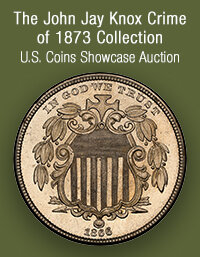 John Jay Knox (1828-1892) was an American banker, author, and politician who served as president of the National Bank of the Republic and helped prepare the Coinage Act of 1873 that officially dropped the silver dollar from U.S. coinage. Knox was appointed Deputy Comptroller of the Currency in 1867 and promoted to Comptroller by President Ulysses S. Grant on April 24, 1872. While in this position, Knox played an important role in the drafting of the Coinage Act of 1873, which eliminated the silver dollar and made the gold dollar the national measure of value. All the pieces in this collection are from John J. Knox, and have remained in the possession of his descendants since his death in 1892. From the invoices and correspondence that accompany the patterns in this collection, it is apparent he had a close relationship with Philadelphia Mint Superintendent Archibald Loudon Snowden.
John Jay Knox (1828-1892) was an American banker, author, and politician who served as president of the National Bank of the Republic and helped prepare the Coinage Act of 1873 that officially dropped the silver dollar from U.S. coinage. Knox was appointed Deputy Comptroller of the Currency in 1867 and promoted to Comptroller by President Ulysses S. Grant on April 24, 1872. While in this position, Knox played an important role in the drafting of the Coinage Act of 1873, which eliminated the silver dollar and made the gold dollar the national measure of value. All the pieces in this collection are from John J. Knox, and have remained in the possession of his descendants since his death in 1892. From the invoices and correspondence that accompany the patterns in this collection, it is apparent he had a close relationship with Philadelphia Mint Superintendent Archibald Loudon Snowden.
The consignor purchased all the items in this auction through a mutual friend of Knox's great-great-granddaughter, a direct descendant of Knox. The sterling silver pieces belonged to Caroline E. Knox (Todd), the wife of John Jay Knox. It is her initials that are engraved on these pieces. Caroline Knox was also a concert pianist.
SOVEREIGN RARITIES AUCTION 10 SELECTIONS
Here are some additional selections from the Sovereign Rarities Auction 10. -Editor
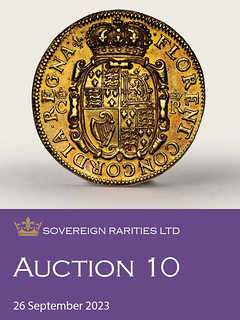 With just over a week to go before our September 26th Auction, we'll be showcasing the very best of the Crowns we have on offer. Mostly from one very well-kept collection accumulated over the last 20 years, the run features numerous standout pieces in remarkable condition. Worthy of particular attention is an iridescent 1700 DVODECIMO of William III, a 1708 Welsh Plumes variety of Anne, a deep prooflike 1821 SECUNDO of George IV, an 1831 Coronation proof issue of William IV, the ever popular 1847 Gothic type Crown of Victoria, an attractively toned 1902 Coronation issue of Edward VII, the rarest of type 1934 Wreath Crown of George V, and lastly the exceptionally rare 1953 matte proof Coronation Crown of Elizabeth II. There are many more that deserve their own time in the spotlight, so please view the full auction available on our website.
With just over a week to go before our September 26th Auction, we'll be showcasing the very best of the Crowns we have on offer. Mostly from one very well-kept collection accumulated over the last 20 years, the run features numerous standout pieces in remarkable condition. Worthy of particular attention is an iridescent 1700 DVODECIMO of William III, a 1708 Welsh Plumes variety of Anne, a deep prooflike 1821 SECUNDO of George IV, an 1831 Coronation proof issue of William IV, the ever popular 1847 Gothic type Crown of Victoria, an attractively toned 1902 Coronation issue of Edward VII, the rarest of type 1934 Wreath Crown of George V, and lastly the exceptionally rare 1953 matte proof Coronation Crown of Elizabeth II. There are many more that deserve their own time in the spotlight, so please view the full auction available on our website.
GEOFFREY BELL AUCTION FALL 2023 SALE
Here's some information and highlights from the Geoffrey Bell Auctions Toronto Coin Expo Fall Sale. -Editor
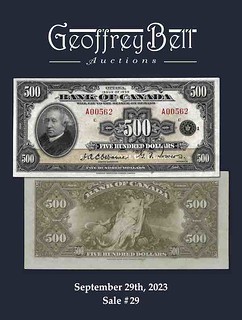 A very special welcome to our 2023 Fall Expo and Warmup Sale to be conducted in conjunction with the Toronto Coin Expo. This sale features a superb selection of chartered banknotes, copper coins from The Robert Turner collection, Part II of the Glassford Error Collection, a nice PEI collection and last but not least is the finest 1935 $500 on the market. The SickKids Foundation have also consigned a donated world coin collection, with all proceeds from these lots, including our services, being donated directly to their mission.
A very special welcome to our 2023 Fall Expo and Warmup Sale to be conducted in conjunction with the Toronto Coin Expo. This sale features a superb selection of chartered banknotes, copper coins from The Robert Turner collection, Part II of the Glassford Error Collection, a nice PEI collection and last but not least is the finest 1935 $500 on the market. The SickKids Foundation have also consigned a donated world coin collection, with all proceeds from these lots, including our services, being donated directly to their mission.
Our complete auction listings for the warm-up sale on Sept. 26th and Toronto Coin Expo Sale on Sept. 29th can be found on our website at GBellauctions.com. The sale includes a diverse Prince Edward Island Collection featuring the Collection of prominent collector Ralph Dickieson
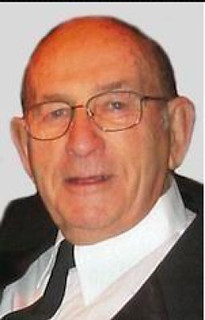 Ralph Dickieson was born and lived most of his life in New Glasgow, Prince Edward Island. He was a life-long collector of coins, paper money, antiques and collectibles. His early career included working as a manger for Co-op Stores, Sumner and Company, and operating his own general store in New Glasgow, PEI. He later worked as an instructor at the Provincial Vocation School (now Holland College). In 1958, he and some other residents of New Glasgow started a fund raising project having Lobster Dinners in New Glasgow. This quickly grew and eventually became a business known as
Ralph Dickieson was born and lived most of his life in New Glasgow, Prince Edward Island. He was a life-long collector of coins, paper money, antiques and collectibles. His early career included working as a manger for Co-op Stores, Sumner and Company, and operating his own general store in New Glasgow, PEI. He later worked as an instructor at the Provincial Vocation School (now Holland College). In 1958, he and some other residents of New Glasgow started a fund raising project having Lobster Dinners in New Glasgow. This quickly grew and eventually became a business known as New Glasgow Lobster Suppers.
Ralph was a founding owner and the general manager from 1958 to 1987. He was active in his community, serving as fire chief of the New Glasgow Fire Department. He was very active in the tourism industry on PEI serving as president of the Cavendish Tourism Association and Tourism Industry Association of PEI. He was the recipient of the Lieutenant Governor's Tourism Award for individuals who have made a significant contribution to tourism on PEI.
Ralph focused his coin collecting on coins, tokens, medals and paper money from Prince Edward Island. During his lifetime, he collected one the best collections of PEI paper money, collecting rare specimens of the Bank of Summerside, Union Bank, Merchant's Bank, Bank of Rustico and Bank of Prince Edward Island. His collection included all of the major known coins and tokens which originated in PEI, including the Holey Dollar, Sheaf of Wheat Token, MacAusland Penny, Ships Colonies and Commerce Tokens, and many others. He was active in the PEI Coin Club serving as President at various times. He was a fellow of the Canadian Numismatic Research Society. He enjoyed researching his acquisitions and was a co-author of the book The Currency and Medals of Prince Edward Island.
He did not collect or try to acquire coins or paper money based on their value or rarity. Rather, he wanted to have a complete
collection, which told a story of the history of PEI in the 19th and 20th centuries. He enjoyed collecting trade dollars, commercial tokens from the 1960s, '70s and '80s which told a story of business on PEI. His collection of dairy tokens tells the story of the dairy industry on PEI. He was always quick to adapt to new technology and enjoyed buying and selling coins on Ebay in the 1990s and 2000s. Ralph passed away in March of 2016 at the age of 88.
MDC OCTOBER 2023 FRENCH COLLECTION 1791-1795
Here are some more selections from The French Collection offered in the MDC Monaco Auction No. 12 coming up in October. This grouping focuses on coins of the constitution and convention periods. -Editor
presented by MDC Monnaises de Collection
Auction October 11, 2023
MDC Monnaies de collection is excited to auction The French Collection
in October 2023.
The collection of 540 lots, built over 40 years, includes the most beautiful coins from the
French Revolution to the Fifth Republic, with a vast majority of Top Pop. Today, it is not
possible to recreate such a collection. We know that many collectors will find in it the special
coins they have been looking for. The auction will take place in Monaco at the Hôtel Métropole on the 11th of October 2023, from 1:30 pm to 4 pm (lots 1 to 296) and from 4:15
pm to 7 pm (lots 297 to 540), Nicolas Gimbert, Auctioneer.
To view the complete collection:
https://mdc.mc/auction/vente-aux-encheres-numismatique-12/
GOATS ON ANCIENT COINS
Mike Markowitz published a new article on CoinWeek about goats on ancient coins. Here's an excerpt - see the complete article online. -Editor
GOATS WERE FIRST domesticated as long as 11,000 years ago, probably in the Zagros Mountains of Iran (Daly, 1). The goat (Capra hircus) became a vital and much-loved element of ancient Greek agriculture, providing milk, meat, wool, and skins. Sure-footed goats easily managed the rugged mountainous terrain of Greece, and could thrive on vegetation that other animals found unpalatable or even toxic. So it is not surprising that goats were frequently depicted on ancient Greek coins and adopted as the emblems of certain cities.
A symbol of fertility, the goat was a companion of the god Dionysus and the goddess Artemis. The constellation of Capricorn, one of the 12 signs of the zodiac, was imagined as a creature with the body of a goat and the tail of a fish. Greek mythology even imagined a race of lustful nature spirits, the satyrs[1], who had human bodies with the ears, tails, and hooves of goats.
MORE ON ARGENTINE ARTIST PAINTING ON BANK NOTES
Bob Van Ryzin and Nick Graver passed along a new article about the artist in Argentina using worthless banknotes as a canvas. Thank you. We first discussed Sergio Díaz in January. -Editor
A jaguar lies beside George Washington. The United States' first president holds a rifle with one hand as he rests the other on the dead Argentine predator.
The backdrop is a U.S. dollar and an Argentine 500-peso note joined like a book, a clear allusion to the rapid depreciation of the local currency, the peso. That has made it difficult for Argentines to make ends meet. The peso has depreciated around 60% compared to the U.S. dollar over the past year. It has occurred in parallel to one of the world's highest inflation rates.

